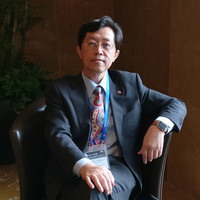

Prof. Lihui Wang
KTH Royal Institute of Technology, sweden
BIO: Lihui Wang is a Chair Professor of Sustainable Manufacturing and the Director of Centre of Excellence in Production Research (XPRES) at KTH Royal Institute of Technology, Sweden. His research interests are primarily focused on human-robot collaboration, brain robotics, real-time monitoring and control, cyber-physical systems, and adaptive manufacturing systems. Professor Wang is actively engaged in various professional activities. He is the Editor-in-Chief of Robotics and Computer-Integrated Manufacturing, International Journal of Manufacturing Research, and Journal of Manufacturing Systems. He has published 12 books and authored in excess of 700 scientific publications. Professor Wang is a Fellow of Canadian Academy of Engineering, AET, CIRP, SME and ASME; the President (2020-2021) of North American Manufacturing Research Institution, and the Chairman (2018-2020) of Swedish Production Academy. He was elected one of the 20 Most Influential Professors in Smart Manufacturing in 2020, and a Gold Medal recipient from Society of Manufacturing Engineers in 2024.
Speech Title:Smart Manufacturing Research at KTH

Prof. George Q. Huang
Chair Professor of Smart Manufacturing; Director of Research Institute for Advanced Manufacturing
The Hong Kong Polytechnic University, China
BIO: George joined Department of Industrial and Systems Engineering at The Hong Kong Polytechnic University in December 2022 as Chair Professor of Smart Manufacturing. Prior to this appointment, he was Chair Professor of Industrial and Systems Engineering and Head of Department in Department of Industrial and Manufacturing Systems Engineering at The University of Hong Kong. He gained BEng and PhD in Mechanical Engineering from Southeast University (China) and Cardiff University (UK) respectively. He has conducted research projects in areas of Smart Manufacturing, Logistics, and Construction through IoT-enabled Cyber-Physical Internet and Systems Analytics. His research has been supported with substantial government and industrial grants. He has directed a strong research team and collaborated closely with leading academic and industrial organizations through joint projects and start-up companies. He has published extensively and his works have been highly cited by research communities. He serves as associate editors and editorial members for several international journals. He is Chartered Engineer (CEng), Fellow of IEEE, IISE, ASME, HKIE, IET and CILT.
Speech Title:In Search of Breakthroughs for High-Performance Cyber-Physical Smart Manufacturing

Prof. Yongsheng Ma
Southern University of Science and Technology, China
BIO: Dr. Yongsheng Ma has joined Southern University of Science and Technology (SUSTech) in Shenzhen, China since July, 2021 as a full professor. Before that, Dr. Ma had been a full professor with the University of Alberta (UA) since 2007. He was an associate professor with Nanyang Technological University, Singapore during 2000-2007. Dr. Ma started his career as a polytechnic lecturer in Singapore (1993-1996); and then a research fellow, senior research fellow and group manager (1996-2000) at Singapore Institute of Manufacturing Technology.
Dr. Ma received his B.Eng. from Tsinghua University, Beijing (1986), both M.Sc. (1990) and Ph.D. (1994) from UMIST, UK. Dr. Ma has had an established research profile with many research projects from different sources, and published more than 200 papers internationally in recognized top journals, conferences, and book chapters. Dr. Ma had served as an Editorial Board Member of Advanced Engineering Informatics (ADVEI, Elsevier) since 2012, and became an associate editor since 2020. Concurrently, he also serves as an associate editor for ASME Journal of Computer Information Science and Engineering (JCISE), and an Editorial Member of Scientific Reports (Springer Nature). Dr. Ma had also been an associate editor of IEEE Transaction of Automation Science and Engineering (2009-2013). Dr. Ma is a member of ASEE, SME, SPE, ASME, CSME and a Canada (Alberta) registered Professional Engineer (P.Eng.) since 2009. In 2012, he won the prestigious ASTech award sponsored by The Alberta Science and Technology Leadership Foundation together with Drader Manufacturing Ltd. Dr. Ma had also served as a senator of UA during 2014-2016.
Speech Title:A Real-time Associative Feature-based Integration Model and Platform for Enterprises in Manufacturing Industry

Prof. Biao Huang
Xi' an Jiaotong-Liverpool University, China
University of Alberta, Canada
BIO: Professor Huang earned his PhD in Process Control from the University of Alberta in Canada in 1997. He received his BSc and MSc degrees in Automatic Control from Beijing University of Aeronautics and Astronautics. Serving as several industrial research chairs, he has spearheaded many research projects. His work has addressed critical challenges in process industries, delivering cost-effective solutions that improve operational efficiency.
Professor Huang has been internationally recognised through fellowships in several highly regarded organisations: Fellow of the Royal Society of Canada, the Canadian Academy of Engineering, the IEEE, the Asia-Pacific Artificial Intelligence Association, the Chinese Association of Automation, and the Chemical Institute of Canada. He is also a respected academic editor, having served as Editor-in-Chief of the IFAC journal Control Engineering Practice, and currently as Co-Editor-in-Chief of the Journal of the Franklin Institute.
With over 600 peer-reviewed Journal publications (over 32,000 citations, H-index 89), five books, and more than 30 keynote/plenary addresses worldwide, Professor Huang works to bridge theory and practice effectively.
Speech Title:The Transformation Path to Intelligent Process Industries

Prof. Jonathan M. Garibaldi
University of Nottingham Ningbo, China
BIO: Prof. Jonathan M. Garibaldi is currently the Provost of the University of Nottingham Ningbo China, and a member of the University of Nottingham Executive Board (UEB). He is Head of the Intelligent Modelling and Analysis (IMA) Research Group and was a Founding Director of the University of Nottingham Advanced Data Analysis Centre (ADAC). After joining the School of Computer Science University of Nottingham in 2002, he became a full Professor in 2012, and held a variety of administrative roles including Admissions Tutor, Director of Teaching and then Head of School from 2016 to 2023.
His main research interest is in developing intelligent techniques to model human reasoning in uncertain environments, with a particular emphasis on the medical domain. He has particular interest in using non-standard fuzzy sets and systems, such as type-2 fuzzy sets and systems, to model human reasoning processes. He has published over 300 papers in internationally peer-reviewed venues, and has led or participated in a wide range of multi-disciplinary research projects worth over £80M.
He is a Fellow of the IEEE, was the Editor-in-Chief of IEEE Transactions on Fuzzy Systems from Jan 2017 to Dec 2022, and is currently Vice President of Publications of the IEEE CIS Administrative Committee.
Speech Title:Emerging Topics in Fuzzy AI

Prof. Zhiyun Lin
Foreign academician of the Russian Academy of Engineering, Fellow of IEEE、IET, Southern University of Science and Technology, China
BIO: Zhiyun Lin is currently a tenured full professor at Southern University of Science and Technology. He received his PhD degree in Electrical and Computer Engineering from University of Toronto, Canada, in 2005, and then he worked as a Postdoctoral Research Associate in University of Toronto from 2005 to 2007. He joined College of Electrical Engineering, Zhejiang University in 2007 as a research professor and then promoted to a tenured full professor in 2011. In 2017, he moved to Hangzhou Dianzi University and worked as the Director of Artificial Intelligence Institute. He joined Southern University of Science and Technology in 2021. He held visiting professor positions at several universities including The Australian National University (Australia), University of Cagliari (Italy), University of Newcastle (Australia), University of Technology Sydney (Australia), and Yale University (USA). His research interests focus on multi-agent systems, distributed artificial intelligence, autonomous systems and swarm robots, and cyber-physical systems. He has authored and coauthored two monograph and over 230 peer-reviewed papers in leading international journals and conferences. According to Google Scholar, his work has been cited over 8600 times. From 2014 to 2023, he has been consecutively selected in the list of Mostly Cited Chinese Researchers by Elsevier. He is a Foreign Full Member of the Russian Academy of Engineering, a Fellow of IEEE, a Fellow of IET and a Fellow of AAIA.
Speech Title:Graph Signal Processing and Learning with Spectral Graph Neural Networks

Prof. Zhinan Zhang
Shanghai Jiao Tong University, China
BIO:Professor Zhang is an Associate Dean of the School of Mechanical Engineering at Shanghai Jiao Tong University. His research interests focus on AI-enhanced engineering design, tribo-informatics, and digital twins. His work has been recognized with three Best Paper Awards from the journal Friction (2021, 2023, 2025), two Best Paper Award Nominations from the Journal Design Studies (2015), and a High Impact Paper Award from journal Science China Technological Science (2024). Additionally, he has been honored with the China Patent Gold Award, the Nuremberg International Invention Gold Award, and the MUSE Design Gold Award, among others.
Professor Zhang has published four books, three chapters in Springer books, and two textbooks. He has authored or co-authored over 200 scientific articles in journals within these fields. He serves as the Conference Chair for the International Conference on Design Science (since 2023) and was a member of the Scientific Committee for the CIRP Design Conference (2023, 2024). He is currently an Associate Editor for the ASME Journal of Tribology and the ASME Journal of Computing and Information Science in Engineering (2023–2025), and also serves on the editorial boards of Friction, npj Advanced Manufacturing, and three other journals. Professor Zhang is also a Fellow of ASME.
Speech Title:Intelligent design of pipeline layouts

Prof. Yanguo Jing
University of Cumbria, UK
BIO: Professor Yanguo Jing is the Dean of Institute of Business, Industry and Leadership, University of Cumbria, UK. He is a Professor in Artificial Intelligence, a Fellow of the British Computer Society, a Certified IT professional and a Principal Fellow of the Advance HE (PFHEA). He has a PhD (Heriot-Watt University, UK), a MSc, a 1st class BSc (Hons) in Computer Science and a PGCert in Learning and Teaching in Higher Education. He has over 25 years’ teaching, research and enterprise experience in the UK and in China. Prof. Jing’s prime research interests are AI and big data. His recent research work focuses on the use of machine-learning methods to capture interaction and user behaviour patterns that can be used to develop intelligent applications. This research has been applied in applications such as business analytics, sports analytics, and user behaviour pattern recognition in social networks and extra-care/ Assisted Living settings. He participated in several research, KTP and consultancy projects with sponsors and clients such as Cadent Gas, Pfizer, Welsh Government, KPIT, UK’s Comic Relief charity and JISC in the UK. Prof. Jing has been instrumental in bringing over £30M funding in innovation and executive education.
Speech Title:The use of machine learning in sports science

Prof. Feng Tian
Chair of Division of Nature and Applied Sciences
Duke Kunshan University, China
BIO: Professor Feng Tian is the Chair, Division of Natural and Applied Sciences, Duke Kunshan Duke University (DKU), China. He has over 20 years of research experience in computer graphics, image processing and machine learning. He has published more than 100 papers in peer-reviewed international journals and conferences, including the top venues such as IEEE Transactions on Visualization and Computer Graphics, ACM Transactions on Modeling and Computer Simulation, IEEE Transactions on Cybernetics, International conference in Machine Learning (ICML), International Joint Conference on Artificial Intelligence (IJCAI), and AAAI Conference on Artificial Intelligence (AAAI). Before joining DKU, Feng Tian was a Professor in Bournemouth University, UK, and an Assistant Professor in Nanyang Technological University, Singapore.
Speech Title:G2L-CariGAN: Caricature Generation from Global Structure to Local Features

Prof. Xinyu Li
School of Mechanical Science and Engineering of HUST, China
BIO: Li Xinyu, Professor and Deputy Dean of School of Mechanical Science and Engineering, Huazhong University of Science and Technology. It is engaged in intelligent manufacturing system, job shop scheduling, intelligent optimization, machine learning and large model research. The related research has been applied to aviation, aerospace, shipbuilding, electronics and other discrete manufacturing industries. He presided over more than 10 national projects. He published more than 100 SCI papers, cited more than 15,000 times in Web of Science, authorized more than 30 invention patents, and developed a large language model in the field of manufacturing system scheduling- ' ModouGPT '. He is the Director-General of the Industrial Big Data and Intelligent System Branch of the Chinese Society of Mechanical Engineering, the Deputy Director of the Intelligent Simulation Optimization and Scheduling Committee of the Chinese Simulation Society.
Speech Title:Large model empowers intelligent manufacturing optimization decision-making

Prof. Weidong Li
University of Shanghai for Science and Technology, China
BIO: Weidong Li is currently with University of Shanghai for Science and Technology (China) as a Chang Jiang Chair Professor and Dean of Mechanical Engineering School. Before that, he worked at Singapore Institute of Manufacturing Technology, University of Bath, Cranfield University, and Coventry University as a Research Engineer, Lecturer, Senior Lecturer, Reader, and Chair Professor. He is Fellow of Institution of Engineering and Technology (FIET), and Fellow of Institution of Mechanical Engineers (FIMechE). His research interests include sustainable manufacturing and human-robot collaboration. His research has been sponsored by Singapore A*Star, European Commission, Innovate UK, EPSRC (U.K.) and NSFC (China). He has published 260 research papers in international journals and conferences, and 5 books (Springer).
Speech Title:End-of-Life Electric Vehicle Battery Recycling and Human-Robot Collaboration